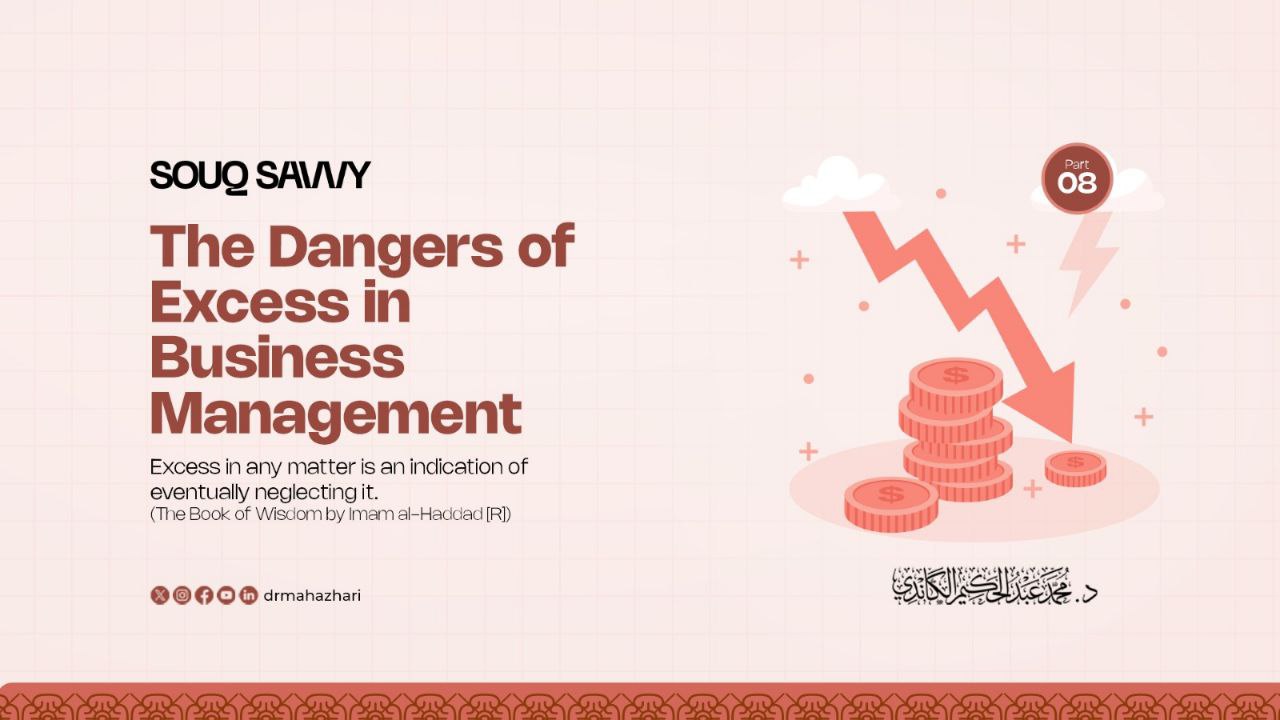Part: 8
The Dangers of Excess in Business Management
Dr. MAH Azhari

Excess in any matter is an indication of eventually neglecting it.
In business management, excessiveness in any aspect often leads to eventual negligence. When leaders micromanage too much, they become consumed by minor details and lose sight of strategic goals. This over-involvement results in inefficiencies, as decision-making slows down and innovation gets stifled. Steve Jobs, during his early years at Apple, was known for obsessing over every tiny detail, which eventually led to his removal from the company in 1985. Only after returning with a more balanced leadership approach did he successfully drive Apple to unprecedented success. Islam teaches moderation in all affairs—as the Prophet ﷺ said, “The best of affairs is the middle way” (Musnad Ahmad). Leaders must ensure a balance between oversight and delegation to maintain sustainable success.
Similarly, businesses that expand too aggressively without ensuring operational readiness often face collapse. A prime example is Carrefour’s attempt to expand rapidly into multiple international markets. Without understanding local business environments, the retail giant had to withdraw from several countries, incurring heavy losses. The Quran advises gradual growth and strategic planning, as seen in the story of Prophet Yusuf (AS), who implemented a structured economic plan for Egypt, ensuring stability during years of famine (Surah Yusuf: 47-48). A business that stretches itself too thin without reinforcing its core risks falling apart.
Excessive cost-cutting also follows the same pattern. Boeing, in an attempt to save costs, outsourced much of its production for the 787 Dreamliner. This decision led to supply chain issues, delays, and quality control problems, damaging its reputation and resulting in financial setbacks. Islam encourages justice in financial dealings—companies should avoid extreme frugality that compromises ethics, quality, or employee welfare. The Quran states, “And do not make your hand as chained to your neck nor extend it completely, lest you become blamed and insolvent” (Surah Al-Isra: 29). A company that balances financial prudence with ethical responsibility secures long-term success.
Over-reliance on a single market or product also demonstrates this principle. BlackBerry, once a leader in the mobile phone industry, focused excessively on its physical keyboard models and enterprise customers while ignoring the rise of touchscreen smartphones. This negligence caused it to lose market relevance as Apple and Android devices took over. Islam encourages adaptability and foresight in business, urging individuals to remain aware of changing circumstances and make informed decisions.
Apart from business decisions, excessive use of resources—whether money, time, or effort—can be harmful. Islam strongly discourages Israaf (wastefulness), whether in personal life or professional settings. The Quran warns, “Indeed, the wasteful are brothers of the devils” (Surah Al-Isra: 27). Many businesses fail because of extravagance—lavish spending on unnecessary luxuries, excessive marketing without return on investment, or mismanagement of human resources. A responsible organization ensures that resources are used wisely, aligning with Islamic principles of balance and accountability.
Sustainable success in business comes from balance and moderation. The Quran states, “And thus We have made you a justly balanced nation” (Surah Al-Baqarah: 143). When any element is overemphasized at the expense of others, it creates vulnerabilities that eventually lead to failure. A well-managed company ensures that no single priority overshadows the broader vision, maintaining strategic equilibrium, ethical responsibility, and a long-term vision rooted in wisdom and sustainability.
